Sept 2011
Sept 2011 Estelle Greeff
Top two make job creation their job
Top two make job creation their job sadminGovernment has announced major changes to the economy to create jobs and speed up infrastructure development.
President Jacob Zuma will head a newly created Infrastructure Commission, while Deputy President Kgalema Motlanthe will chair a new Job Creation Commission to reaffirm governmnt's commitment to these important issues.
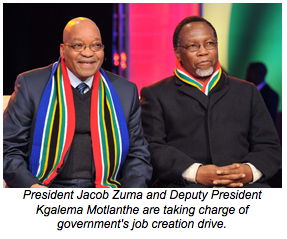 The two structures were announced after Cabinet's recent three-day Lekgotla in Pretoria. Because of the importance of job creation and infrastructure in dealing with poverty, Cabinet agreed that these should be managed through The Presidency.
The two structures were announced after Cabinet's recent three-day Lekgotla in Pretoria. Because of the importance of job creation and infrastructure in dealing with poverty, Cabinet agreed that these should be managed through The Presidency.
Improve capacity
“This intervention will systematically improve the capacity of state agencies to deliver infrastructure and help connect the work of all spheres of government,” said Minister in The Presidency Collins Chabane.
The Infrastructure Commission will oversee all major national projects, monitor their budgets and make sure that the projects are put into practice. It also aims to improve the delivery of infrastructure. To this end, struggling provinces will receive help from a special programme to tackle key blockages in service delivery.
Recovering from crisis
On job creation, Minister Chabane said more than 900 000 South Africans lost their jobs following damage to the South African economy caused by the global economic crisis that started in 2008.
“The Cabinet Lekgotla resolved to fast track interventions that will help create employment,” the Minister said. Cabinet approved a 12-point plan that will see the State using short-term employment schemes, business develop-ment and investment by government in a number of projects, to deal with unemployment.
A million opportunities
Short-term job schemes will include the expansion of the Community Works Programmes to about one million positions by 2013. Through the Jobs Fund, more resources will be allocated to projects that create jobs.
The Rural Development and Land Reform Department will oversee job creation aimed at helping small-scale farmers to increase their production and the development of infrastructure in rural towns. Cabinet said other interventions would include growing small businesses.
Develop skills
Minister Chabane said the Lekgotla had also proposed that all government departments spend at least one per cent of their payroll on skills development. Training should focus on increasing artisanship throughout the public service.
Cabinet also noted that the recent local elections had highlighted the need to speed up the delivery of basic services and infrastructure, especially in rural areas. On service delivery, Cabinet promised to pay urgent attention to providing water, sanitation, electricity, roads and other basic services.
Letters to the Editor - Give us a piece of your mind
Letters to the Editor - Give us a piece of your mind sadminWinning letter - Use your talents
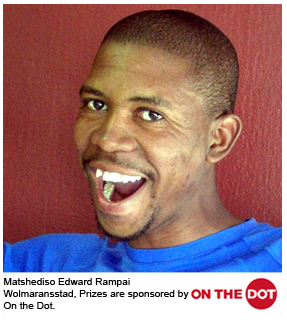 I am a 24-year old male, running my very own car wash business. I would like to convey the following message to the youth of Mzansi: let us take the initiative to do things because our economy is in our hands. It is quite evident that that the councillors, mayor as well ministers tend to forget that we the citizens play an integral part in the growth of our economy.
I am a 24-year old male, running my very own car wash business. I would like to convey the following message to the youth of Mzansi: let us take the initiative to do things because our economy is in our hands. It is quite evident that that the councillors, mayor as well ministers tend to forget that we the citizens play an integral part in the growth of our economy.
– Matshediso Edward Rampai, Wolmaransstad, North West
If any of the information published in Vuk’uzenzele has helped you in any way to improve your life, we would love to hear all about it. For example if Vuk’uzenzele has motivated or helped you to start your own business, getting a bursary or a job, please tell us how we have helped you. Don’t forget to include your telephone or cellphone number and address.
Let's change the world
I have realised that many people who have finished matric are at home or do piece jobs and blame it on their poor backgrounds or blame the government. Let’s not blame our poor backgrounds, the government has done its best. If we don’t apply in higher institutions or ask for help, who will apply for us? I came from a rural area where there was no information and my childhood has never been exciting but I told myself that after matric I want to go to varsity regardless of my situation. Now, I’m at varsity studying electrical engineering. Let’s get educated and change the world we live in. We have FET colleges, technikons and universities for us to utilise them.
– Mxolisi Mtsweni, Amsterdam, Mpumalanga
The value of education
One Chinese guy said that education is like a double-edged sword. It may be turned to dangerous uses if it is not properly handled. While the fool wonders, the wise man asks. Victor Hugo is quoted as saying that he who opens a school door, closes a prison. Education is not the preparation for life; it is life itself. Its purpose is to replace an empty mind with an open one. All teachers, therefore, have to realise that they affect eternity because they can never tell where their influence stops.
– Samuel Radebe, Heilbron, Free State
Face the future
It’s time we face the future in our lives. This process of sitting on the corners and waiting for success to fall into our laps must end. We must be committed to improve our lifestyle as youth of South Africa and be proud of it. We all have different talents and skills, so let’s use them to achieve success so that we can lead our families and feed them. All of us have different and unique ideas, let’s combine them and be a strong pillar so that we can raise ourselves and our communities up. Our government and many organisations will be willing to help us if they see that we are committed and willing to achieve our goals.
– Vuyisile Nomabunga, Petrusburg, Free State
Unite against HIV and Aids
Let us unite and stand together in our fight against HIV and AIDS. We must stop the hatred and encourage acceptance of those living with the disease. They are human beings just like us and can live a long and healthy life if they get the support they deserve.
It is really painful to be victimised because of one’s status. I suggest that the ones who commit such cruelty should first get tested before pointing fingers. Let’s rather love one another and show our heartfelt support to those around us.
– Ramodipa Emmanuel, Ga-Kgapane, Limpopo
Vuk'uzenzele, Private Bag X745, Pretoria, 0001, or e-mail: vukuzenzele@gcis.gov.za.
If you don’t want your real name published you may use a different name, but please include your real name and address.
Please note:
To win a prize you must include a physical address and a contact telephone number.
Prizes that re not claimed within 90 days of publication, will be forfeited.
ARV push in Gauteng
ARV push in Gauteng sadminGovernment’s focus on health as a national priority is gaining pace in South Africa’s economically most important province.
Gauteng’s Health and Social Development MEC Ntombi Mekgwe has set firm targets for providing anti- retroviral treatment to more people living with HIV, increasing male circumcision services and fighting the spread of tuberculosis.
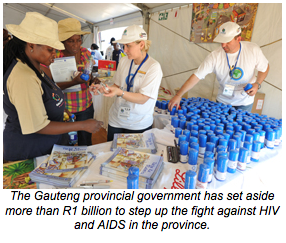 This drive is taking off as the province records the success of public information campaigns that have resulted in fewer people between the ages of 15 and 24 being infected with HIV. Mekgwe recently announced that 1 019 Gauteng nurses had been trained to provide ARVs to improve access to treatment in the province. It will also reduce the waiting time for people who need treatment.
This drive is taking off as the province records the success of public information campaigns that have resulted in fewer people between the ages of 15 and 24 being infected with HIV. Mekgwe recently announced that 1 019 Gauteng nurses had been trained to provide ARVs to improve access to treatment in the province. It will also reduce the waiting time for people who need treatment.
By the end of March 2010, about 417 000 people in the province were getting ARVs. The Gauteng Department of Health aims to increase this to 520 000 by March next year.
Treatment sites
By the end of June 2010, 286 ARV treatment sites had been set up in Tshwane, Ekurhuleni, Metsweding, West Rand, Sedibeng and Johannesburg.
To provide treatment closer to where people live, especially rural areas, ARV sites will be increased to 385 by the end of March 2012. Mekgwe noted that apart from increasing access to treatment, education and awareness campaigns would continue. She said safe-sex campaigns in schools, wards and NGOs had already notably reduced new HIV infections in youth between 15 and 24 years.
Snip of change
The launch of government’s HIV Counselling and Testing Campaign started by President Jacob Zuma has led to more than 2,7 million people in the province testing by mid-June. Services for medical male circumcision will be increased to reach 125 000 men by the end of March 2012.
Tackling TB
While the province is making progress in a number of ways, tuberculosis (TB) continues to hold onto its deadly reputation as the number one killer among HIV positive patients.
Patients with multi-drug resistant TB often suffer a loss of income since they have to be admitted to hospitals for treatment for up to 18 months. This is a major concern, especially if patients are the main source of income for their families.
To make sure that people can continue treatment while living with their families, the department will soon introduce the Community Multi-Drug Resistant programme. This involves community healthcare workers and trained family members who provide twice daily, home-based, multi-drug resistant TB medication and HIV treatment.
This will also include patients and families being supported through a programme called Directly Observed Treat-ment Supporters. These supporters are assigned by TB nurses to patients within their communities whom they must assist with continuous support to take their treatment to the end.
GeneXpert
GeneXpert technology, which reduces the waiting time for TB test results to two hours, is already available at Chris Hani Baragwanath Academic and Edenvale Hospitals. It reduces the chances of patients not returning to hospitals to get their results, due to the long waiting periods.
In addition, an amount of about R300 million has been set aside to fight the spread of TB in the province from now until 2012.
“We will continue to ensure that TB cases are detected early so that those who are infected are placed on treatment thus curbing the spread and infection of the community at large,” Mekgwe said.
Have a heart for your heart
Have a heart for your heart sadminHeart disease is one of the leading causes of death worldwide. In South Africa, more than 195 people die each day from heart diseases.
To make people more aware of the dangers of heart disease, September is National Heart Awareness Month. This is an opportunity for the Department of Health to educate people about how they can avoid heart disease by adopting healthy lifestyles and to look out for the warning signs of heart disease.
Heart awareness
Heart Awareness Month in South Africa coincides with World Heart Day on 28 September, which was created by the World Health Organisation (WHO) to inform and educate people around the world about heart disease.
This year, World Heart Day is centred on the theme “Take responsibility for your own heart”.
Apart from leading a healthy lifestyle, people should also be aware of the possible warning signs of heart attacks and strokes. Knowing the warning signs is very important as this will help you, your family or friends to seek help before it’s too late.
Who is at risk?
Anyone can get heart disease, but people with the following, are at a higher risk:
- a family history of heart disease
- high blood cholesterol
- high blood pressure
- overweight.
Did you know?
- Worldwide, more than 17 million people die every year from heart diseases and strokes.
- 33 heart attacks and 37 heart failures occur in South Africa every day.
- 60 strokes occur in South Africa every day.
- One in three men and one in four women will develop a heart condition before the age of 60.
How to avoid heart disease
- follow a healthy, balanced diet
- get regular exercise
- do not smoke
- drink alcohol in moderation
- maintain a healthy body weight
- have your blood pressure checked regularly
- have a medical check-up regularly
- when you are in stressful situations, breathe deeply to help you relax.
Tips for a healthy balanced diet:
- eat small and regular portions
- include five servings of fruit and vegetables daily
- include fish as part of your diet twice a week
- limit your intake of red meat and fat
- limit your intake of refined sugar and sugary food and drinks
- limit your intake of refined starches like white bread
- limit your alcohol intake.
Fighting skin-deep prejudice
Fighting skin-deep prejudice sadminCases have been reported of people with albinism being abducted, killed or being discriminated against because of their skin colour.
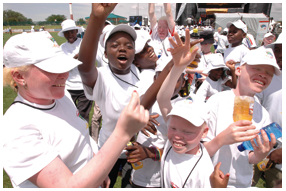 This happens because there are still many mistaken beliefs about albinism. But people with albinism are no different than anyone else and should to be treated with the same respect as everybody else. In South Africa, September is Albinism Awareness Month, during which the Department of Health provides information on albinism to make people more aware about this physical condition.
This happens because there are still many mistaken beliefs about albinism. But people with albinism are no different than anyone else and should to be treated with the same respect as everybody else. In South Africa, September is Albinism Awareness Month, during which the Department of Health provides information on albinism to make people more aware about this physical condition.
This is also an opportunity to draw attention to the contribution of people with albinism to our society and economy across a range of sectors.
What is albinism?
Albinism is an inherited condition. This means it is carried over from past generations by parents to their children. It is caused by a fault in the skin pigment or colour called melanin. This leads to a loss of colour in the skin, hair and eyes.
It happens when both parents carry one faulty and one normal gene. Genes are units in the body that parents pass to a baby before it is born. When a baby inherits two faulty genes, one from each parent, albinism is the result.
Some facts about Albinism
- Albinism does not affect a person’s intelligence.
- Albinism can cause problems with eyesight.
- People with albinism are very sensitive to strong light and the sun.
How to prevent skin and eye problems
- Avoid direct sun on the skin.
- Protect the skin and eyes by wearing dark glasses, wide-rimmed hats, long-sleeved shirts and long trousers.
- Apply sunscreen lotion to areas of the skin that are in the sun.
- Visit a skin specialist (a doctor who is an expert in the treatment of skin problems, also called a dermatologist) regularly, especially if you have sores that do not heal quickly.
Bringing justice closer to home
Bringing justice closer to home sadmin“Access to justice is a fundamental human and democratic right, a central pillar of a free and equal society,” said President Zuma.
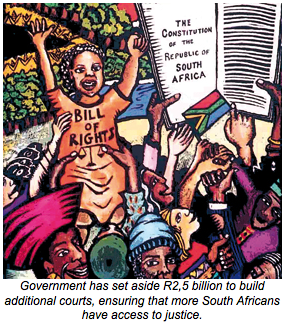 Speaking at a recent conference on access to justice, President Jacob Zuma said that more courts were needed since some South Africans did not have transport to reach courts, which were often far from their homes.
Speaking at a recent conference on access to justice, President Jacob Zuma said that more courts were needed since some South Africans did not have transport to reach courts, which were often far from their homes.
Quality justice for all
The theme of the Johannesburg conference, attended by 350 delegates from 11 countries, was Towards Delivery of Accessible Quality Justice for All.
Traditional leaders, representatives of civic organisations and the Portfolio Committee on Justice, as well as members of the legal profession and the Department of Justice and Constitutional Development were among those who attended.
Wrongs affecting rights
“Access to justice is a fundamental human and democratic right, a central pillar of a free and equal society,” said President Zuma.
“Many people do not know the law and do not exercise their rights due to poverty-related lack of education and ignorance,” he said.
He noted that although much progress had been made in improving access to justice for all South Africans, issues such as poverty, lack of education and resources interfered with government’s delivery on this constitutional right.
President Zuma said because the poor did not have resources, they could not afford legal fees and therefore could not fully enjoy equal benefits. While Legal Aid South Africa offered legal representation free of charge to those who cannot afford it, there was a need to expand this service.
He said more than R437 million had therefore been set aside to increase the work of Legal Aid South Africa.
Justice for women
To promote access to justice for women, government is continuing with its programme of establishing Thuthuzela care centres for victims of sexual and domestic abuse. The number of centres recently increased from 17 to 27.
The centres provide services and support to women and girls who are victims of domestic violence and sexual abuse. It also offers them temporary shelter until long-term solutions are found.
Basic rights
President Zuma added that the public needed to be educated about the justice system so that they could become aware of their basic rights, as well as the different courts and the structures they could turn to with problems.
The lack of communication about court cases was a source of frustration for those involved, he noted. People often travelled long distances only to find out their cases had been postponed.
Government was therefore looking at ways to ensure that victims of crime attended court sittings, enabling cases to be concluded successfully.
Legal Aid South Africa has a toll free call centre to assist with legal advice on child and family law, as well as land disputes. The Legal Aid Advice Line number is 0800 110 110.
See you (back) in court…
See you (back) in court… sadminMany communities take the law into their own hands instead of working with government to stop crime. They often justify their actions by saying that suspects in criminal cases are arrested and then given bail just to commit crime again.
Guilty or innocent
According to the law, an accused is innocent until a court finds that he or she is guilty. When bail is granted in a criminal case, the accused must undertake to attend the court case until he or she is found guilty or not.
It is up to the prosecutors to persuade the presiding officer that the granting of bail will serve the best interest of justice or not. If there are strong indications that the accused might not attend his or her court case or leave the country, the prosecutor will oppose the granting of bail.
Valid address
Usually bail is also refused if the accused cannot give the court a valid physical address where he or she could be found in case of not turning up at court.
The accused will not be given bail if there are good reasons to believe that he or she may intimidate witnesses. If the prosecutor cannot provide sound reasons for the refusal of bail, the accused will be granted bail.
Bail usually comes with certain conditions, including reporting at a local police station at specific times, handing over passports or staying away from witnesses.
Did you know?
To improve public understanding of the legal system and the rights associated with it, the National Prosecution Authority (NPA) has started a public education programme in partnership with SABC Education to educate the public about various subjects related to the work of the NPA.
The programme is called Legal Features and is broadcast by the SABC on 15 radio stations nationally in all official languages. For more information and programme schedules, visit the NPA’s website www.npa.gov.za/
Hands off our cops!
Hands off our cops! sadminSafety & Security
"The time has come for communities to say 'hands off our cops'..." - National Police Commissioner General Bheki Cele.
With more and more police officers losing their lives in the line of duty, police are looking to communities to help put an end to police killings.
At least 56 police officers were killed during the first seven months of 2011. Police Minister Nathi Mthethwa described the deaths as a crisis.
In an effort to address the problem, police recently held a summit on police killings. Community policing forums, business, civic organisations, media, research and academic institutions, as well as other interested parties came together to share their expertise and help government tackle the issue.
Adopt -a-Cop
Based on suggestions that arose from the summit, the Police Ministry put together a programme of action.
As part of the programme, police plan to launch the Adopt-a-Cop campaign. The aim of the campaign is to change the behaviour of people towards police officers by encouraging them to see police officers as part of their families.
Police Ministry spokesman Zweli Mnisi said the campaign would raise awareness about police killings. “When people watch the news and see that another cop has been killed we don’t want them to think of it as just another statistic. People need to care and get involved. If they believe there is a criminal at a certain house, they must report that to police,” Mnisi said.
Mobilise communities
Another aspect of the programme of action will be the hosting of provincial summits to mobilise communities across the country. “Police can never deal with crime alone. They need the help of communities and of all South Africans,” Mnisi added. He pointed out that community involvement was very important in fighting crime. In the past, many communities have already shown their support and made a difference by passing on information to police and by helping to track down police killers.
The provincial summits will discuss how all the relevant parties can help put an end to the killing of police in that particular province.
Heavier sentences
Other aspects of the programme include improving police training; establishing a committee to investigate the killings; giving more support to the families and friends of police officers who are killed; and flying national flags at half-mast at all police stations whenever a police officer is killed.
The Minister also called for harsher sentences to be handed down to those guilty of killing police.
Let's support the class of 2011
Let's support the class of 2011 sadminWith the 2011 matric examinations just weeks away, every learner should be making the most of this time to prepare for the most important exams of their school careers.
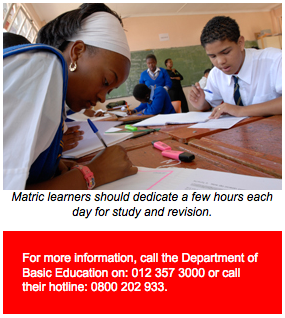 For Grade 12 learners, the last and most important lap of their school careers starts on Monday 24 October 2011 when they will sit for the final matric exams.
For Grade 12 learners, the last and most important lap of their school careers starts on Monday 24 October 2011 when they will sit for the final matric exams.
But, in the spirit of the national call to action, "Working Together, We Can Do More", success in the exam room doesn't depend only on the learner's effort. Matric is a family – and community – venture and adventure.
All parents should support their children to ensure they perform at their best as these exams may be the most important they may ever write.
Learners should be encouraged to make studying part of their everyday routine, to avoid the risk of last-minute cramming.
The Department of Basic Education offers the following tips to help learners make the best of their study time:
Establish a routine
Dedicate a few hours each day for study and revision. Learners should also set a timetable so that they cover all subjects in an organised way. Vary the study programme so that each day is dedicated to a different subject.
Create a comfortable study environment
Create a comfortable environment for studying and revising away from all distraction, such as television and other household noise. Make sure you have all your required study materials before you start studying. This will ensure you are able to focus without disruption.
Read and write
Reading correctly is an essential skill to ensure you understand the exam questions and answer accordingly. Read at least 1 000 words every day. The same goes for writing. Write at least 400 words every day – carefully and accurately.
Past papers
Make use of the exemplars and past Grade 12 examination papers that are available. They will provide learners with a sense of how the examination papers are laid out and what is expected of them. These papers are often made available by schools and can be found on the Department of Basic Education’s website, www.education.gov.za along with other study material.
Look after yourself
Drink plenty of fluids, especially water, and eat healthy foods. Keep sugary and fatty foods to a minimum. Make sure you get enough sleep each night. Get regular daily exercise and try to keep up sporting activities.
Use your support systems
Don't be afraid to ask for help from your family, friends or teachers. Whether it's grasping a new concept or understanding something you learnt earlier in the year, they will be happy to help.
How can parents help?
- Make sure there is a quiet place for your child to study.
- Display the exams timetable where everybody can see them.
- Reduce the chores your child has been given so that he or she can concentrate on studying.
- Monitor how your child studies.
- Do not take over, but work through a problem with your child.
- Be a role model for learning; for example, read newspapers, read with your child, remain committed to lifelong learning.
- Be part of what your child learns in everyday life.
- Most importantly, show interest in school and homework.
Making South Africa a reading nation
Making South Africa a reading nation sadminNational Book Week is celebrated from 6 to 13 September. It is an initiative of the South African Book Development Council (SABDC) in collaboration with the Department of Arts and Culture to make South Africa a reading nation. The celebrations coincide with International Literacy Day on 8 September.
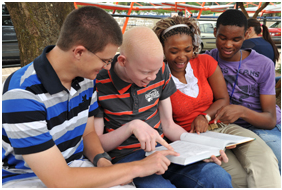 National Book Week aims to encourage people to read more, increase awareness of the importance of reading for the development of the nation and promote the publishing industry.
National Book Week aims to encourage people to read more, increase awareness of the importance of reading for the development of the nation and promote the publishing industry.
Recent research by the SABDC shows that 51 per cent of South African households do not have a single book in their homes and that only 14 per cent of South Africans are active readers. Only 5 per cent read to their children.
Everyone can participate in National Book Week. Read to your children; donate books to schools, children’s homes or old age homes; join a library; start a book club; exchange books with friends or teach a child to read.
Many libraries will have special programmes during this week. Museum Africa in Johannesburg will host a reading programme with a variety of activities for children, adults, schools and the general public. Entrance is free and everyone is welcome.
For more information, call the Department of Arts and Culture on: 012 441 3000, or call the SABDC on: 021 914 8626/7.
You can also send an e-mail to: bookweek@sabookcouncil.co.za
Laying foundations for better learning
Laying foundations for better learning sadminThe Western Cape provincial government is building new schools, upgrading existing ones and adding classrooms to others as part of its commitment to ensure quality teaching and learning.
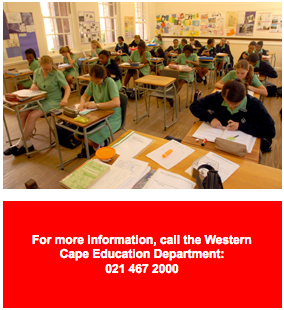 Twenty-five new schools and hundreds of additional classrooms will be built in the Western Cape over the next three years as part of wiping out the backlog in schools infrastructure in the province.
Twenty-five new schools and hundreds of additional classrooms will be built in the Western Cape over the next three years as part of wiping out the backlog in schools infrastructure in the province.
Safer buildings
The Western Cape Department of Education will replace unsafe and unsuitable school buildings with stronger structures. Twenty schools in the province that were built with unsuitable materials are set to be replaced with brick and cement structures within three years.
The new plan focuses on schools where there has been a drop in the quality of infrastructure over a long period of time. In most cases, these buildings were built during the apartheid era, using wood or chipboard materials.
Good progress
Education MEC Donald Grant, who recently inspected the construction work that is underway to replace the old Oaklands High School in the Lansdowne/Kenwyn area of Cape Town, , said he was happy with the progress on the site. With the new building, more learners will now have a chance to learn in suitable and safe environments.
The replacement of a 57-year old wooden building at Oaklands High started in February last year and is expected to be over by the end of this year. An amount of R29,5 million has been set aside for the building.
Moveable classes
The building includes 27 classrooms, two computer rooms, a library, a new assembly hall and new administrative building, as well as new staff and visitor parking, five laboratories and additional sports facilities to be built on the old school’s site once the building work is done.
Where necessary, moveable classes will be used to accommodate learners during the building process.
Other schools, which are currently under construction include Masibambane High School, Thembalethu, MM Mateza, Plantation, Enshona, Fairview and Cloetesville Primary Schools.
Blowing new life into rural Limpopo
Blowing new life into rural Limpopo sadminChronic poverty and hunger due to a lack of jobs in the deep rural village of Ha-Matsila in Limpopo is now in the past. Job-creation projects in the area are blowing new life in to the community.
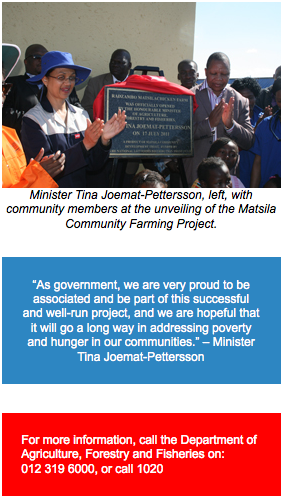 The Matsila Community Farming Project in Limpopo is giving new life to this area where many people have been struggling to make a living in the past.
The Matsila Community Farming Project in Limpopo is giving new life to this area where many people have been struggling to make a living in the past.
The project, which was recently unveiled by the Minister of Agriculture, Forestry and Fisheries, Tina Joemat-Pettersson, is already developing agricultural productivity in the area. Minister Joemat-Pettersson said the project would not only provide jobs for the local people, but would also provide food to residents.
“As government, we are very proud to be associated and be part of this successful and well-run project, and we are hopeful that it will go a long way in addressing poverty and hunger in our communities,” the Minister said.
More crops
The Community Farming Project, situated in the dusty village of Ha-Matsila, under the Makhado Municipality, include cattle, goat and chicken farms. There is currently a total of 180 goats, a herd of cattle with 50 Nguni cows, two bulls and 4 000 chickens with the capacity to lay up to 3 000 eggs per day.
The village’s young traditional leader Livhuwani Matsila said they are planning to introduce more diverse range of crops soon. This will include planting tomatoes and cucumbers on a large scale at their 200-hectares farm in the area.
In addition, they will start a fish farm since there is a river in the settlement. The construction of the required fishing facilities should start soon, he said.
Rural Development Programme
Another boost for job creation in the village comes from the Comprehensive Rural Development Programme which was launched at the village in August last year.
As part of the Rural Development Programme, the community trust together with Resource Africa, is constructing a guest house on top of a hill in the village. Chief Matsila said the thatched guesthouse is for tourism purposes and will be completed by November this year.
“The bricks we are using were made by the villagers themselves, the artisans, engineers and brick layers are all from this village,” he said.
So far, the Matsila project has created jobs for 300 local residents in the village with a population of about 2 000 people.
Residents of Ha-Matsila are proving that fighting poverty with successful job-creation projects are possible with the active participation of the local people.
Much-needed help for rural youth
Much-needed help for rural youth sadminThousands of young people in a rural Mpumalanga municipality will benefit from a new youth advisory centre.
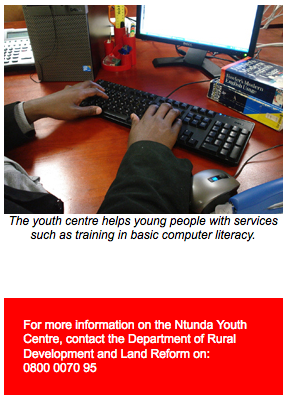 The Ntunda Youth Centre was set up at Ntunda Village in Nkomazi Local Municipality outside Malelane in Mpumalanga to provide facilities, resources, information and skills to local out of school and school-going youth.
The Ntunda Youth Centre was set up at Ntunda Village in Nkomazi Local Municipality outside Malelane in Mpumalanga to provide facilities, resources, information and skills to local out of school and school-going youth.
Ntunda village has been identified as one of the poorest wards in the country by government’s War on Poverty and the centre provides much-needed help to those who have limited or no study resources at home.
The centre helps young people from five local villages with services such as printing and research for their school assignments. In addition, young people also get training in basic computer literacy to enable them to write their assignments.
Funding
The Rural Development and Land Reform Department together with the Mpumalanga Social Development Department provided funding for the Ntunda Youth Centre.
An amount of R366 000 was made available through the national depart ment’s Comprehensive Rural Development Programme (CRDP) and the provincial government’s Community Development Programme.
The centre’s Deputy Secretary, Ncamisile Lubisi, said to date R266 000 of the total funding has been used to build the centre and buy five computers and a laptop.
Internet
“The computers have full Internet connection and this helps young people when researching for their school assignments and projects. In addition, the Internet service is also used by students attending higher education centres to help them do research work for their assignments”, said Lubisi. She added that the remaining R100 000 would be paid to fund the buying of the additional four computers and other needs for the centre.
Guidance
“We provide basic training in computer literacy as well help to type and print curricula vitae (CVs) for youth so that they can apply for jobs. We also teach them how to write a CV. In addition, we provide career guidance for those young people still at school,” said Lubisi.
“We allow each person to use the computer for 30 minutes so that everybody can have a chance. We sometimes open during weekends particularly during examination times as the centre is also used as a study centre.”
Clinic
The Mpumalanga Department of Health also uses the centre as a spaza clinic – a meeting point from which the department’s mobile clinic operates once a week to provide primary health care service to villagers.
Skills and education promoted by accord
Skills and education promoted by accord sadminJob creation remains one of government's top priorities. The New Growth Path is designed to create five million jobs in the next decade. Skills development and education are key factors in achieving this goal.
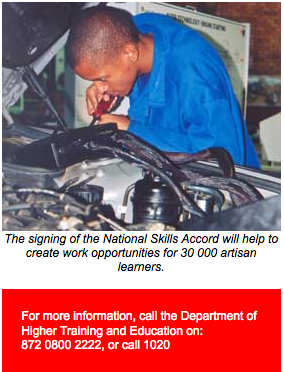 Work opportunities beckon for 30 000 new artisan learners this year thanks to the signing of the National Skills Accords in July. The accords are a partnership between government, labour and business.
Work opportunities beckon for 30 000 new artisan learners this year thanks to the signing of the National Skills Accords in July. The accords are a partnership between government, labour and business.
The Skills Accord and the Accord on Basic Education have been created to promote skills development and education. The accords identified eight key areas, including improving the level of training using facilities that already exist and making internship and placement opportunities available at workplaces.
In collaboration with SETAs, employers have committed to the training of 30 000 artisans as part of the accords.
Internships
Each year, various companies will make 12 000 internships available for students who complete their certificates at FET colleges. Third-year students at universities of technology who need work experience as part of their qualification will get access to 5 000 internships. Work opportunities will also call for at least 16 000 lecturers at FET colleges phased in over three years.
Government will create internship opportunities in the public sector with at least 20 000 apprentices enrolled at state-owned enterprises between 2011 and 2015.
Artisan trainees
Up to 2015 Eskom will enrol 7 000 artisan trainees with an additional 400 trainees being considered depending on funding terms. Eskom will also enrol 7 500 unemployed matriculants over three years in trade skills training programmes. Transnet will enrol 3 400artisan trainees ending in 2015 with South African Airways enrolling 875 people. Denel will employ 600.
Spending on training by business will also be improved beyond the compulsory one per cent training levy with the accord urging companies to spend between three and five per cent of their total salary bill voluntarily on training.
Basic Education
The Accord on Basic Education and partnerships with schools is based on the recognition that government on its own cannot address the problems faced by the education system. This accord creates space for social partners to help improve the quality of basic education.
Schools
Under this accord organised labour, business and community organisations will support between 100 and 200 schools in 2011. This will increase to between 500 and 1 000 schools next year. “It came at the right time. The accord will help redirect resources,” Basic Education Minister Angie Motshekga said.
“Addressing education and skills development is one of the core aspects of the New Growth Path,” said Economic Development Minister Ebrahim Patel. The Growth Path is designed to create five million jobs in the next decade. Skills and education are key elements in the growth path.
Organised labour and business, as well as community organisations have made a commitment to support between 100 and 200 schools in the Adopt-a-School initiative.
More nurses, better health
More nurses, better health sadminThe Gauteng Department of Health and Social Development has made a commitment to increase the intake of nursing students in the next five years to help build an effective health system.
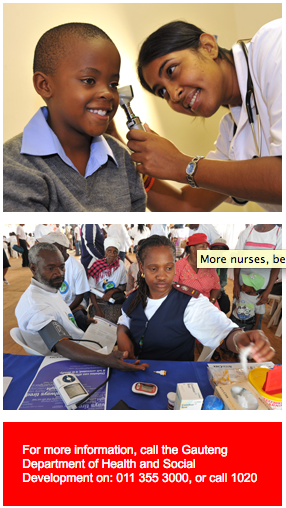 The department aims to recruit a total of 2 660 new nursing students to start training in 2012.
The department aims to recruit a total of 2 660 new nursing students to start training in 2012.
In the next five years, the department aims to increase the intake by 25 per cent per year.
Provincial Health and Social Development MEC Ntombi Mekgwe noted that over the past eight years, the department had annually been increasing the number of students admitted for training in its colleges by 20 per cent. She said the number of student nurses admitted for training in Gauteng has increased almost fourfold.
Nursing colleges
The reopening of two nursing colleges, Bonalesedi and Rahima Moosa, has resulted in the intake of student nurses growing from 500 in 1998/99 to 1 968 in 2010/11.
Mekgwe has instructed that further attempts should be made to increase the enrolment of nurses, particularly in specialised fields such as midwifery.
Training
Since 2009, the department has also been training pharmacy assistants and clinical associates.
The first group of these professionals are expected to graduate in 2012. They will be employed at district hospitals and clinics where they will be able to assess patients, make diagnoses, prescribe appropriate treatment and undertake minor surgical procedures under the supervision of qualified medical practitioners.
The department will advertise health science bursaries at the end of August this year. The next intake of nurses will be in January 2012.
Bursaries: SAFCOL (South African Forestry Company)
Bursaries: SAFCOL (South African Forestry Company) sadminSouth African Forestry Company (SAFCOL) is the Government's forestry company, conducting timber harvesting, timber processing and related activities both domestically and internationally. It is undergoing a strategy review for its eventual disposal.
Introduction
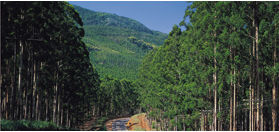 SAFCOL/KLF recognises people as the nucleus of any company. Development and training within an organizational context is an investment that will pay return on the company’s investment in terms of motivation, enhanced performance and commitment
SAFCOL/KLF recognises people as the nucleus of any company. Development and training within an organizational context is an investment that will pay return on the company’s investment in terms of motivation, enhanced performance and commitment
SAFCOL/KLF commits resources and time to ensure that learners are able to access education and training opportunities in order to plough their learning experiences back into the surrounding communities, industries and the country.
SAFCOL/KLF invests substantially in skills and development programmes. The programmes include bursary schemes aimed at the development of learners according to the needs identified in our business with preference to young people from historically disadvantaged communities specifically those adjacent to our operations. People with a disability are eligible to apply. SAFCOL/KLF aims at is to ensuring that opportunities are made available within a framework that addresses race, gender and disability.
SAFCOL/KLF offers opportunities to qualifying learners who wish to pursue a career towards a Degree or Diploma in the following priority fields:
Field of study
- Forestry/Research
- Sawmilling (Wood Technology)
- Civil and Mechanical Engineering
Limited space is available to learners who wish to study towards the following fields of study/ Disciplines.
- Finances/ Accounting
- Information Technology
- Environmental Management
- Human Resources
- Marketing
To be eligible for the SAFCOL/KLF Institution of higher learning bursary, you must
- be a South African citizen
- have Matric exemption
- be proficient in English
- Mathematics HG (C)
- Physical Science HG (C)
- Biology HG (C)
- computer literate, MS Word and Excel
- comprehensive selection testing and a psychometric test is compulsory
- allocation of bursary based on merits
- compulsory Learnership Forestry Bridging Programme (1 year)
- maximum study of four years
- bursary will be suspended if learner fails 60% of courses registered
- the bursary will have to be paid on cancellation (full value together with interest at prime rate plus 2%)
What the bursary covers
- registration fees
- tuition fees
- residence fees
- allowance for practical (theoretical) training
- travelling expenses
- study material
How to apply
All interested learners are to complete the application form and should send short written motivation stating clearly why they are applying for a bursary from SAFCOL/KLF, a two page CV, and certified copies of your ID and Grade 12 results or copies of latest academic record. To the following address:
Attention: Lerato Mogane
Human Capital Management
Komatiland Forests (Pty) Ltd
Private Bag X 11201
Nelspruit
1200
Fax: 013 755 4938; Tel: 013 754 2700
Closing date: 31 October annually
Safer tourism for a stronger economy
Safer tourism for a stronger economy sadminTourism is a major resource for creating jobs and growing the economy. The safety of tourists, both local and international, is therefore vitally important. Ensuring safe tourism is related to government's priorities of fighting crime and creating jobs.
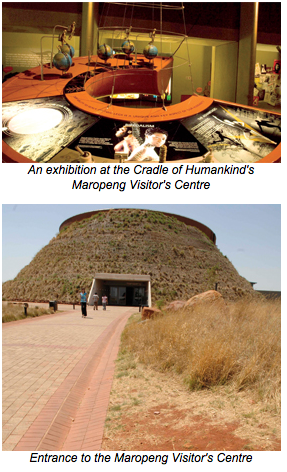 To increase tourist safety in Gauteng, the Gauteng Tourism Safety Monitor project was created. It is a pilot job creation initiative, which involves the Gauteng Department of Community Safety, the South African Police Services, the Gauteng Department of Economic Development, the Cradle of Humankind World Heritage Site and the national Department of Tourism.
To increase tourist safety in Gauteng, the Gauteng Tourism Safety Monitor project was created. It is a pilot job creation initiative, which involves the Gauteng Department of Community Safety, the South African Police Services, the Gauteng Department of Economic Development, the Cradle of Humankind World Heritage Site and the national Department of Tourism.
Community
The project began in July with the recruitment of 200 local community members who were chosen from a list of safety patrollers kept by the Department of Community Safety. These safety monitors or patrollers were appointed at the Cradle of Humankind World Heritage Site, which includes Kromdraai, Tarlton, Krugersdorp, Magaliesburg, Hekpoort and Muldersdrift.
They will be responsible for giving assistance to tourists who enter the heritage site and for helping to prevent criminal activities. The monitors will have direct contact with the police to ensure that the police will act quickly to crime against tourists.
Training
The safety monitors will receive proper training in subjects such as Nature Site Guiding, Occupational Health and Safety, Customer Care, Business Skills and Safety Monitoring. After successfully completing the training they will receive certificates, as well as a set income.
The national Department of Tourism is supporting this project with an injection of R10 million from the Expanded Public Works Programme budget. The safety monitors will initially be given a one-year contract, which may be extended after the impact of the project has been evaluated.
Safe destination
The project will play in important role in the Cradle of Humankind World Heritage Site being considered as a safe tourist destination by both domestic and international tourists. This could further lead to more tourists visiting the site, either for leisure or for business, which in turn will encourage economic activity and job creation.
Young people in Gauteng who are interested in becoming community patrollers in the fight against crime can contact the Department of Community Safety’s Ms Pamela Pule at pamela.pule@gauteng.gov.za or 011 689 3600, or call 1020
Limpopo strides towards job targets
Limpopo strides towards job targets sadminAs South Africans are slowly recovering from the global economic downturn, the Limpopo provincial government is making great strides in creating jobs.
“Job creation is one of the priorities that we have set for ourselves as government. We are working full throttle to translate our commitment to make 2011 a year of job creation through meaningful economic transformation and inclusive growth into reality,” said Limpopo Premier Cassel Mathale.
He said the province was committed to fight poverty and unemployment to improve the livelihoods of its people.
Permanent jobs
In the first quarter of the current financial year, the provincial government created over 62 400 permanent jobs. This was done in response to the commitment made earlier this year by provincial government to create more than 166 100 jobs in the public sector.
The Office of the Premier created 143 jobs; Public Works 581, Agriculture 1 536; Sport, Arts and Culture 15, Education 17 890; Local Government and Housing 939; Treasury 17; Safety, Security and Liaison 2; Roads and Transport 19 978; Health 8 860 and Social Development 2 566 jobs.
Temporary jobs
The Extended Public Works (EPWP) sector in Limpopo has created over 17 800 temporary jobs during the period under review.
The social sector has created 3 303 jobs; infrastructure 9 337; environment 307; while the non-state sector has created 4 927 jobs through the EPWP programme.
call 015 295 1006; or fax 015 295 1163
Full-steam ahead into the 21st century
Full-steam ahead into the 21st century sadminSince the Gautrain project got off the ground some two years ago, more than 100 000 direct and indirect jobs have been created. In the longer term, about 2 700 direct and indirect jobs a year would be created for operation and maintenance of the system.
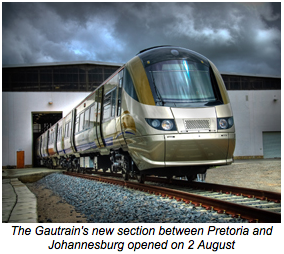 It is estimated that by the end of October this year, more than R3 million had been spent on buying locally produced goods for the Gautrain, while a further R2 million had gone towards small businesses involved in the project. Since it first began operating the Sandton to Oliver Tambo International link at the beginning of June 2010, more than a million passengers have made use of the Gautrain.
It is estimated that by the end of October this year, more than R3 million had been spent on buying locally produced goods for the Gautrain, while a further R2 million had gone towards small businesses involved in the project. Since it first began operating the Sandton to Oliver Tambo International link at the beginning of June 2010, more than a million passengers have made use of the Gautrain.
Transport Minister Sibusiso Ndebele has welcomed the latest phase of the Gautrain from Johannesburg to Hatfield in Pretoria, which opened on 2 August. It will extend from Rosebank Station in Johannesburg to Hatfield in Pretoria. The Gautrain’s bus services will also be fully operational along this route.
“The main challenge facing our country is to modernise our railway system in a manner that promotes growth and development. We need new rail technologies to meet the demands of the 21st century,” said Ndebele. “Our ability to efficiently move freight and people is vital to a modern, thriving economy.”
Travelling at 160 km/h and taking 38 minutes between Johannesburg and Pretoria, the Gautrain will set a benchmark for similar developments in the rest of the country.
Funding For Heritage Projects
Funding For Heritage Projects sadminThe National Heritage Council (NHC) is a statutory body established in terms of Section 3 of the National Heritage Council Act No. 11 of 1999. It has, as one its key mandates, a responsibility of disbursing funds for approved heritage projects. In allocating these funds, the National Heritage Council aspires to expand the base of participation of heritage organisations in the country.
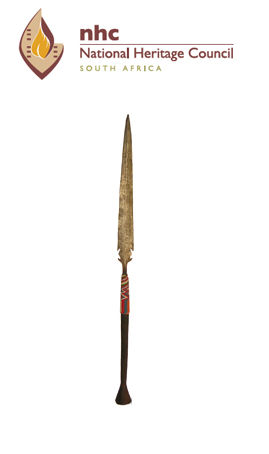 Do you have a project on heritage and need funding? The National Heritage Council would like to help you and your community. Apply now! Closing date – 20 September 2011
Do you have a project on heritage and need funding? The National Heritage Council would like to help you and your community. Apply now! Closing date – 20 September 2011
Applications are invited from the following:
- Educational institutions participating in heritage projects
- Non-profit making organisations (NPOs)
- Parastatal bodies involved in heritage projects
- Non-governmental Organisations (NGOs)
- Community based Organisations (CBOs)
- Local Government Bodies involved in heritage projects (Municipalities)
- Associations
- Individuals who are involved in heritage projects/programmes- and must be willing to partner with credible institutions for their project implementation and reporting
- Foundations
- Trusts
- Section 21 companies not for gain.
NB: Organisations that qualify for funding but do not have the necessary compliance requirements must be willing to be administered or partner with credible organisations or institutions for purposes of financial reporting (audited financial statements) and capacity building. (A memorandum of understanding must be entered into to define the partnership and roles of the partnership.)
Applications from the following are not eligible to apply for funding from the NHC will not be considered:
Close Corporations (CCs); Private companies (Pty) Ltd; Section 21 for gain; Employees of the National Heritage Council and their immediate families; Projects that were funded by the Department of Arts and Culture and its related institutions; Applicants who receive funding from other donors should make a full disclosure and detail a justified need for NHC to consider the application.
Requirements
1. Funded initiatives:
Projects must have been initiated in South Africa and support the National Heritage Council Strategic Initiatives with preference given to projects that respond to the government’s national imperatives including but not limited to the following: Education and Awareness, Poverty Alleviation, Nation Building, Transfer of skills, Capacity Building, Sustainable impact projects, Equity and redress of historic imbalances, Creation of partnerships.
2. Important applications guidelines:
Applicants must be on the official NHC forms which are available on the website www.nhc.org.za or can be requested through our e-mail address: funding@nhc.org.za or telephone number 012 348 1663
3. How to submit your application:
Post:
The National Heritage Council
P O Box 74097
Lynnwood Ridge
0040.
Hand delivery:
Office No. 16
Domus Building
No 57 Cnr Kasteel and Ingersol Roads
Lynnwood Glen
Pretoria
NB: No faxed and emailed application forms will be accepted.
4. Applications received without the following compliant documents will not be considered:
NHC application form; Your company/organisation registration certificate/Trust Deed; Your current Tax Clearance Certificate; Latest signed audited financial statements; Certified identity documents of authorised persons and a business plan.
5. How will you know if your proposal was successful:
Successful applications will be contacted directly and published on the NHC website and annual report after contractual agreements are concluded. Should applicants not hear from the NHC 90 days after the closing date, they should consider their application unsuccessful.
NB: Successful applicants will be subjected to verification prior to official notification
6. Funding ranges:
Small : up to R50 000
Medium : R51 000 - R100 000
Large : up to R1m
7. Closing date: 20 September 2011, 15h00. Applications received after the closing date will not be considered.
The National Heritage Council reserves the right to award or not to award funding
P.O Box 74097
Lynnwood Ridge
South Africa
0040
Domus Building
Office no. 016
57 Kasteel Road
Lynnwood Glen
South Africa
0081
Tel: 012 348 1663/8233, Fax: 012 348 2833
E-mail: nhc@nhc.org.za
Denel Technical Academy (DTA) Aviation, Engineering and Artisans Training Opportunity - 2012
Denel Technical Academy (DTA) Aviation, Engineering and Artisans Training Opportunity - 2012 sadminDenel Technical Academy (DTA) provides accredited technical training to organisations, clients and learners in the fields of Aerospace, Engineering and Advance capabilities.
 Apprentice programs for 2012 are available to candidates seeking intensive study in technical disciplines stemming from aviation and engineering- related professions.
Apprentice programs for 2012 are available to candidates seeking intensive study in technical disciplines stemming from aviation and engineering- related professions.
Note: qualifying candidates are to have successfully completed Mathematics and Physical Science preferable at Grade 12 or N3 level, as well as speak, read and write English.
DTA requests private and public organisations to contact us and join us in investing to this artisanship managed skills development program for a better tomorrow.
Please visit our website at www.deneltraining.com for more information and to complete the application form, or contact us at info@deneltraining.com. You can also give us a call on 011 927 4465/ 011 927 2811. On-campus residential facilities are also available.
Please apply now to avoid disappointment.
Note: DTA does not offer nor guarantee bursaries. Fee structures will be discussed upon acceptance.
Youth vision on Housing 2030
Youth vision on Housing 2030 sadminYouth matters
South Africa currently has a housing backlog of over two million units. Youth were given an opportunity recently at a youth summit to present their vision to Human Settlements Minister Tokyo Sexwale on what they would like to see in housing in 19 years’ time.
Human Settlements Summit
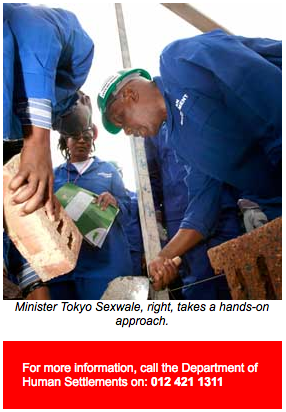 During the summit called Human Settlements: Vision 2030 Youth, which was held in Durban last month, the minister said 12,5 million people needed to get homes.
During the summit called Human Settlements: Vision 2030 Youth, which was held in Durban last month, the minister said 12,5 million people needed to get homes.
The summit focused on appropriate, affordable and good quality shelter.
Youth delegations from the nine provinces discussed their visions for affordable and quality housing projects by 2030.
Live and learn
The Minister said the issue of human settlements was not just about building houses, it was about transforming cities and towns and building unified, sustainable and caring communities with closer access to work and social facilities, including sports and recreation facilities.
“Where we live must also be where we can learn; where we live must also be in the proximity of leisure, where we can play ... pray and so on,” the minister said.
Transformation
Arts and Culture Minister Paul Mashatile, who was also at the summit, said a programme was in the pipeline to train young people to become designers as they had a role to play in transforming the country. He also called for more youth to be trained as bricklayers and plumbers.
Financial knowledge
Sexwale urged youth to get an understanding of the role of financial services, banks and other financial institutions in terms of buying properties.
There were many uncertainties facing the youth and the uncertainty of the global economy was a major one.
The Minister said although South Africa was not affected as heavily as some other countries by the last global economic recession, the next one could have more serious consequences for our economy. He urged the youth to learn about the processes involved in owning a home, including how to apply for and access a housing loan
"Where we live must also be where we can learn; where we live must also be in the proximity of leisure, where we can play ... pray and so on."– Minister Tokyo Sexwale
Youth act against crime
Youth act against crime sadminYouth matters
It is not ‘cool’ to use drugs,” was the message from Deputy Minister of Police Maggie Sotyu to young people. She was speaking at the launch of a recent Crime Prevention and Youth Mass Mobilisation campaign at Galeshewe in the Northern Cape.
“Drugs are both a crime and a cause of crime,” said Minister of Police. She emphasised the importance of good parenting in this regard as it could go a long way in the fight against drugs and drug abuse. She also urged young people not to engage in or be influenced by any criminal activities.
Equal partners
The theme of the campaign, “Youth Act Against Crime” fits in with the Police Ministry’s goals of reducing crime, particularly against women and children, Deputy Minister Sotyu noted.
She asked young people to identify role models within their communities and not to idolise criminals whose future were already doomed. “All the glamour and glitz which you see being flaunted by these criminals is only temporary and does not last. In fact, I want to instruct police officers in this area to be tough on these heartless criminals, who sell you drugs!” she said.
Role models
The Deputy Minister noted that police leadership did not see themselves as experts who knew better than everybody else, but as equal partners in finding solutions to eradicate crime, particularly substance abuse. She said they wanted to learn from young people: “You are after all, the future. We therefore cannot shape our country’s future as elected leaders if we do not take you on board.”
She praised the youth of Galeshewe for showing commitment to help fight crime, because government could not fight crime alone. All members of communities, including the youth are therefore urged to participate in community policing forums and more directly by reporting crime where they encounter it.
The following safety tips from the Police can help prevent crime:
- Promote and become part of any legal action against crime in your community.
- Become a frontline crime-fighter and join the Police Reservists.
- If you know of, or suspect any crime or criminals, please let the police know about them! For police assistance, call 10111. To leave information anonymously, call Crime Stop on 08600 10111 or report criminal activity through the SAPS Website: Feedback Form
- For more information, contact your local police station.
Milestone for International Year of Youth
Milestone for International Year of Youth sadminYouth matters
A delegation of young people from South Africa had an opportunity to be part of international talks in New York when they attended the United Nations High Level Meeting on Youth in July. Executive Chairperson of the National Youth Development Agency (NYDA) Andile Lungisa led the delegation.
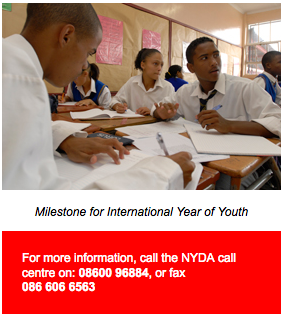 The meeting was held under the theme “Youth: Dialogue and Mutual Understanding” and is one of the key milestones for marking 2011 as International Year of Youth.
The meeting was held under the theme “Youth: Dialogue and Mutual Understanding” and is one of the key milestones for marking 2011 as International Year of Youth.
The youth discussed issues on international cooperation to address common youth challenges beyond national borders. This included ways of sharing opportunities for strengthening economic, social and cultural relations for the benefit of youth.
They also discussed challenges that effect education and employment among the youth. Delegates from different countries also shared knowledge from their experiences with fighting poverty through creating jobs for youth. They proposed long-term solutions to the development challenges facing young people worldwide.
This was especially relevant for the South African delegation as unemployment among youth is a serious challenge. Official statistics indicate that among the 25 percent unemployed South Africans about 70 per cent are young people.
Meet Minister Marthinus van Schalkwyk
Meet Minister Marthinus van Schalkwyk sadminKnow your Minister
Minister Marthinus van Schalkwyk is a lawyer and political scientist by profession. He was born on 10 November 1959 and hails from Polokwane. His academic qualifications include a B Proc degree as well as a Bachelor of Arts Honours degree and Master of Arts degree in Political Science from the University of Johannesburg (previously Rand Afrikaans University). He is married to Suzette and they have two children, Christiaan and Maryke.
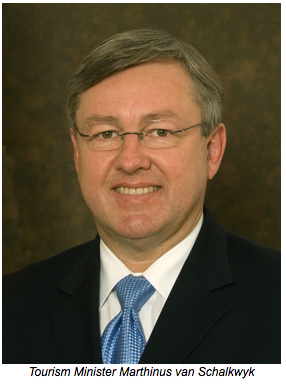 Minister van Schalkwyk has served as a Member of National Parliament since 1990. He later, in 2002 to 2004, also held the helm of the Western Cape Province when he took up office as the Premier of that Province. In 2004 he assumed the role of South Africa’s Minister of Environmental Affairs and Tourism and in 2009 he became the Minister of Tourism, an office which he currently holds.
Minister van Schalkwyk has served as a Member of National Parliament since 1990. He later, in 2002 to 2004, also held the helm of the Western Cape Province when he took up office as the Premier of that Province. In 2004 he assumed the role of South Africa’s Minister of Environmental Affairs and Tourism and in 2009 he became the Minister of Tourism, an office which he currently holds.
His decorations, among other, include Chairperson of the Aviation, Travel and Tourism Industry Agenda Council of the World Economic Forum (WEF) for the 2010/11 period. In February 2010, he also chaired the inaugural meeting of the T.20 Tourism Ministers, and successfully hosted the UNWTO Summit on Sport, Tourism and Mega-events in Johannesburg.
Minister van Schalkwyk has subsequently become one of the thought leaders in this burgeoning industry, which saw South Africa successfully hosting the FIFA 2010 World Cup.
Explore our beautiful country
Explore our beautiful country sadminKnow your Minister: Tourism
September is Tourism Month and with the focus this year on domestic tourism, South Africans are encouraged to discover and explore their own beautiful country.
Domestic tourism, also called internal tourism, refers to people travelling and visiting places in their own country. To encourage domestic tourism, the Minister launched a new campaign in March this year. He also announced the domestic tourism figures for 2010.
Domestic tourism has historically been, and remains, the largest contributor to tourist volume in South Africa with 79 per cent of all tourism in 2010 derived from local people.
Job creation
The Department of Tourism aims to create 225 000 new jobs by 2020. To this end, it also aims to increase the number of foreign arrivals to South Africa from 7 million in 2009 to 15 million by 2020, increase tourism’s total contribution to the economy from R189 billion in 2009 to R499 billion by 2020 and increase the number of domestic tourist from 14,6 million in 2009 to 18 million by 2020.
The Department of Tourism plans various programmes for Tourism Month with special celebrations taking place in Clarens in the Eastern Free State.
Celebrate the many facets of our diverse culture
Celebrate the many facets of our diverse culture sadminKnow Your Minister: Tourism
South Africans will be celebrating Heritage Day on 24 September. Nelson Mandela used the phrase “rainbow nation” to describe South Africa’s different cultures, customs, traditions, histories, and languages. This day is a celebration of that diversity.
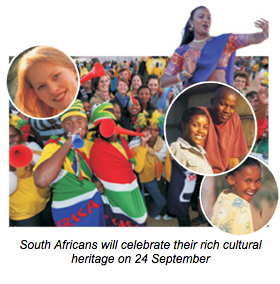 It is a day to celebrate South African culture in the form of creative expression, our history, language, the food we eat, the land in which we live, the sum total of wildlife and scenic parks, national memorials, historic buildings, works of art, literature and music.
It is a day to celebrate South African culture in the form of creative expression, our history, language, the food we eat, the land in which we live, the sum total of wildlife and scenic parks, national memorials, historic buildings, works of art, literature and music.
It’s also a day to reflect on who we are, where we come from and where we are headed as people. Mostly, it is about togetherness and teamwork - attributes that have helped to build the rainbow nation and that will keep the rainbow intact for years to come.
There are many ways to celebrate Heritage Day. Learn to sing our anthem; learn one of our 11 languages and discover the culture of the people who speak it; fly the flag; learn about the role our past has played in shaping what we have become today by reading books about our history or biographies of some of our heroes; live ubuntu be welcoming and show warmth to fellow South Africans and visitors alike; buy South African products and make use of South African services.
A heritage boost for tourism
A heritage boost for tourism sadminKnow Your Minister: Tourism
The Arts and Culture Department, in cooperation with the Department of Tourism, is working on a programme that will see the country's heritage resources boost tourism.
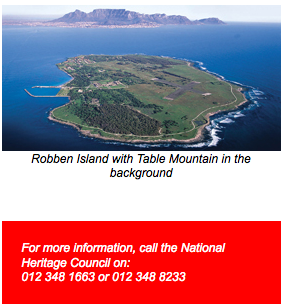 The National Liberation Heritage Route was started as a celebration of the history of the struggle for freedom. The project seeks to document, as well as preserve, the memory of South Africa’s liberation movements.
The National Liberation Heritage Route was started as a celebration of the history of the struggle for freedom. The project seeks to document, as well as preserve, the memory of South Africa’s liberation movements.
The Liberation Heritage Route is a project of the National Heritage Council (NHC), which is an agency of the Department of Arts and Culture. The route is already a major attraction to tourists because it reflects the country’s rich history through its changing phases from oppressive regimes until democracy.
The project is aimed at identifying and recording different stories, events and sites related to the liberation struggle. Some of these sites form part of South Africa’s list of possible World Heritage sites.
Economic development
Heritage tourism is one of the most important resources that can be used for economic development in South Africa.
With South Africans from all walks of life celebrating their rich heritage this month, the departments of arts and culture and of tourism and the respective agencies that report to them have identified this new kind of tourism as a way to contribute to job creation as part of government’s New Growth Path.
By attracting tourists, many of South Africa’s museums and other heritage resources such as our World Heritage Sites like Robben Island and Mapungubwe, contribute to social and economic development.
Local communities
In addition to international tourists, the NHC aims to make our heritage more accessible to local communities. Many of these have limited or no access to it, especially those living within or around the localities in which some of the heritage sites are situated.
Profits gained from heritage tourism will be invested back into preserving heritage sites so that they would continue to attract more tourists which in turn would provide more jobs.
Thank you, Mr President, our problem has been solved
Thank you, Mr President, our problem has been solved sadminPresidential Hotline
The Presidential Hotline continues to be a last resort to help find solutions to problems when all else had failed. But callers are reminded that they should never abuse the hotline or make prank calls as this can delay the process for other callers who really need help.
Funding for housing
 A North West community found that the Presidential Hotline was indeed a last resort when there was no other way out. Thanks to the Presidential Hotline, a long-awaited housing project could be completed.
A North West community found that the Presidential Hotline was indeed a last resort when there was no other way out. Thanks to the Presidential Hotline, a long-awaited housing project could be completed.
Liza Chununvu from the community says she and fellow community members at Ventersbort Village outside Mahikeng have been waiting for the completion of their government houses since 2005.
The housing project was started in 2005, but the contractor only built the foundation and allegedly left without finishing the project. For six years, the community waited to have the project completed with no response from the local municipality.
Chununvu then turned to the Hotline for help. This resulted in the North West Human Settlements Department making money available for the housing project to be completed.
Case reopened
In another matter, also in the North West, a complainant asked the Presidential Hotline to have a case reopened after local police refused to investigate the matter. She had laid a charge of malicious damage to property against a drunken tractor driver in 2007.
The house of Jan Mogare, a resident in Tshing Location, Ventersdorp, was badly damaged by an out-of-control tractor. Mogare said the owner of the tractor asked him to get quotations for materials and cost to repair the damaged house.
Later, the tractor owner said he would go ahead and do the repairs himself but did not. Mogare approached the Public Protector and the Independent Complaints Directorate (ICD) after the police could not give him feedback on the charge he had laid against the suspect.
When the Presidential Hotline made enquiries about the matter, the police said the delay in the case was because of the outstanding results of the alcohol test done on the suspect. The case was then reopened after the results were found and police are now looking for the suspect.
Magora called the Presidential Hotline to say he was happy that the case had been reopened.
Water and electricity
A Limpopo resident Morongwe Thobejane who had complained about the absence of service delivery in her village has reported that the area has since received electricity.
Thobejane of Glencowie under Makhudutamaga Local Municipality complained about a lack of water and electricity in Manotong Village in Ward 7. She told Hotline staff that the problem had been reported to the Ward 7 councillor several times, but nothing had been done until she approached the Hotline. Eskom has since supplied electricity to the area, Thobejane said.
Drinking water
An Eastern Cape resident has thanked the Hotline for making it possible for his community to get water and a community hall.
Vuyisile Nodada of Moyaneni outside Matatiele under the Mzimvubu Local Municipality had phoned to complain about lack of sanitation and safe piped drinking water.
Nodada said the municipality has since made available piped drinking water on a temporary basis and a new community hall is nearing completion. He said the municipality promised to attend to the problem of sanitation.
Presidential Hotline number:
17737 (1 PRES)
Fax: 086 681 0987 or 012 323 8246
e-mail: president@po.gov.za
Your Hotline questions answered
Your Hotline questions answered sadminPresidential Hotline
When was the Presidential Hotline established?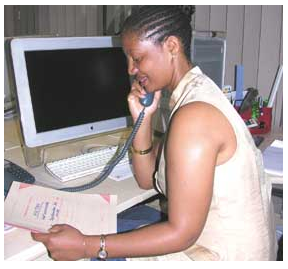
In his State of the Nation Address on 3 June 2009, President Jacob Zuma announced his plan to establish a Presidential Hotline to improve access of members of the public to government.
The Hotline was opened on a pilot basis on 14 September, and officially launched on 7 October 2009.
What is a public liaison officer (PLO)?
PLOs are government representatives at national, provincial and local government level, who attend to calls and provide feedback to callers. All calls relating to service-delivery issues are routed to the PLOs for investigation and for providing feedback to the caller.
How does the Presidential Hotline work?
All calls from the public to the 17737 number are received at the State Information and Technology Centre (SITA) in Centurion near Pretoria (which is the first line of support). They are then screened and general enquiries are attended to and resolved immediately. The calls are logged onto the call logging and tracking platform. Callers are provided with a reference number so that they can follow up if necessary.
Calls that cannot be resolved at the first line (Call Centre at SITA) are transferred to the second line located at the Union Buildings or are assigned to third-line support which is public liaison officers (PLOs) in the relevant ministries or premiers’ offices). These people are responsible for finding solutions to the complaints and reporting back. Throughout this process, progress is monitored through the logging and tracking system.
The public liaison function in The Presidency (second line) deals with correspondence that is received by fax (086 681 0978), e-mail (president@po.gov.za), via the website (www.thepresidency.gov.za), social networks (Facebook and Twitter) or that is delivered by hand.
What are the hours of operation?
The first-line support at SITA is open from 6 o’clock in the morning to 10 o‘ clock at night on weekdays (excluding public holidays). The second- and third-line support operates during normal business hours.
How long does each call take?
The average time taken to log a call is about 15 minutes, reduced from an initial average of 19 minutes.
Who should use the Hotline?
Ordinary citizens and entities that have been failed by the public service, and have no direct access to authority can use the Hotline as a last resort.
Who should not use the Presidential Hotline?
Service providers and individuals who receive payment for the services they render.
Does the Hotline charge a fee for its service?
No, the Presidential Hotline is a government service that is offered free of charge to all who use it.
Does the Presidential Hotline deal with government issues alone?
Most of the queries are government related, but the Presidential Hotline does not turn anyone away. On matters that are private and legislative, the Presidential Hotline will help to refer clients to someone who can help them.
Why should the Presidential Hotline be used as a last resort?
The Presidential Hotline and public liaison service does not replace the existing hotlines and public liaison facilities of departments, provinces or municipalities. It is intended to be used as a last resort, where other systems have failed.
Are queries formally referred to the respective provinces for further action?
Yes, queries that cannot be resolved at the first line are referred to provinces as soon as they are received.
It is the responsibility of the relevant provinces and departments to attend to those queries and to ensure that they are resolved.
Ubuntu beyond borders
Ubuntu beyond borders sadminInternational relations
Government in cooperation with the South African Aid organisation Gift of the Givers has called on South Africans to help Somalia by donating whatever they can to help our fellow Africans in need.
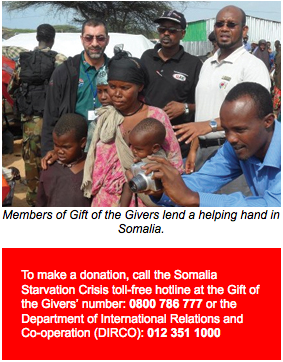 More than 3 million people in Somalia are battling hunger in the worst drought the country has seen in the past 60 years. The southern part of the country was declared a famine region by the United Nations (UN). Nearly half of the Somali population of approximately 3,7 million people are in crisis.
More than 3 million people in Somalia are battling hunger in the worst drought the country has seen in the past 60 years. The southern part of the country was declared a famine region by the United Nations (UN). Nearly half of the Somali population of approximately 3,7 million people are in crisis.
Funds and goods
“Africa should lead that response because these are our brothers and sisters,” said Gift of the Givers founder Imtiaz Sooliman.
South Africa’s Department of International Relations and Cooperation (DIRCO), partnered with a number of non-governmental and relief organisations, to deliver aid to the famine and drought-stricken Somalia, as well as the refugee camp on the border of Kenya and Somalia.
International Relations Deputy Minister Marius Fransman says the department is doing everything in its power to help alleviate the situation in the country. South Africa so far has donated funds and goods worth more than R1 million.
“We are calling on South Africans to rally together to support the people of Somalia. Let’s do it for the children, mothers and the elders who are dying of hunger.” - Marius Fransman, Deputy Minister of International Relations
Rally together
“We are calling on South Africans to rally together to support the people of Somalia. Let’s do it for the children, mothers and the elders who are dying of hunger.” In addition, food parcels, tents and water purification equipment as well as medical kits have also been delivered.
Telethon
In a bid to raise more funds for the victims, the South African Broadcasting Corporation (SABC) held a special three-hour telethon live on its breakfast show Morning Live. SABC staff, management and celebrities manned the phone lines for the pledges.
“We feel that it is not enough just to inform South Africans about what is happening in Somalia - we also have to do something and help the people in Somalia ... and I think the time has come for South Africans and Africans to not be helpless spectators when a catastrophe like this happens on our own continent,” said SABC Acting Group Executive for News.
Partnership strengthens historic ties
Partnership strengthens historic ties sadminInternational relations
South Africa and Tanzania have agreed to form a partnership to better address mutual challenges and improve the lives of their citizens.
President Jacob Zuma recently met the President of Tanzania Jakaya Kikwete at the Union Buildings in Pretoria. They talked about ways to improve cooperation in various areas including the fight against poverty, underdevelopment and HIV and AIDS.
To this end, the two presidents signed an agreement to establish the binational Commission, which will increase cooperation between the two countries.
In line with this agreement, they will meet every year to identify and discuss mutual challenges. They will also look at how they can work together to create opportunities to ensure economic and industrial development leading to job creation and alleviation of poverty.
Historic relationship
South Africa and Tanzania have been in a historic relationship that stood the test of time, especially relating to South Africa’s freedom. During apartheid, many South Africans went to Tanzania as a hiding place.
Tanzania now expects South Africa to do the same to help other African countries in crisis situations. “We applaud South Africa’s leadership. South Africa is Africa’s only economic, political and military power of significance. South Africa therefore has a leadership responsibility on the African continent,” Kikwete said.
The country is already helping to bring peace to other countries like Libya, the Democratic Republic of Congo and South Sudan, among others.
Arts and culture
During the meeting, an agreement was also signed on cooperation in the fields of arts and culture. It will promote mutual knowledge and understanding of the cultures, history and way of life in the two countries.
Zuma and Kikwete also discussed the importance of strengthening partnerships in the fields of energy, agriculture, mining, infrastructural development and water.
Important beacon
“This historic visit will go down in the annals of history as an important beacon of relations between our two nations, who will forever be bound by a history of struggle, sacrifice and common dedication to freedom, justice and the creation of a better life for all,” said President Zuma.
SA reaches out to Africa’s youngest state
SA reaches out to Africa’s youngest state sadminInternational relations
South Africa is reaching out and helping to build the newest African nation, South Sudan. South Sudan is the world’s newest country. It was born on 9 July this year, after it broke away from Sudan.
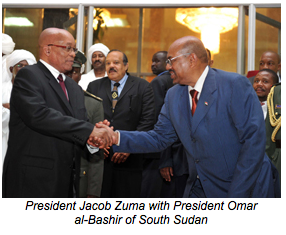 The people of Sudan and South Sudan voted to split in January 2011 as part of a 2005 peace deal aimed at ending the decades of violence between the two sides.
The people of Sudan and South Sudan voted to split in January 2011 as part of a 2005 peace deal aimed at ending the decades of violence between the two sides.
South Sudan is the 54th state in Africa and the 193rd member of the United Nations. However, the decades of unrest has left the country with a number of challenges like poverty, lack of basic infrastructure, political insecurity and lack proper of government structures.
Skills training
South Africa has already helped to train more than 1 500 South Sudan government workers and representatives. The training will improve the workers’ skills, which will in turn boost job creation and service delivery.
South Africa also aims to sign a Memorandum of Understanding regarding agricultural development. This will help to build up South Sudan’s economy and will support food security.
The South African government has also undertaken to continue giving aid to both the Republic of Sudan and South Sudan, to help fight poverty in both countries.
Peace
South Africa has played an important role in bringing peace to Sudan and South Sudan. Among others, former president Thabo Mbeki was a leader for the African Union team that participated in negotiations to bring an end to the conflict in Sudan.
Statistics South Africa counts South Africa
Statistics South Africa counts South Africa sadminAdvice and events
Statistics South Africa (Stats SA) has put in place measures that will ensure that every person who finds himself or herself in South Africa between 10 and 31 October is counted. This will avoid missing some people in large numbers as was the case during past censuses.
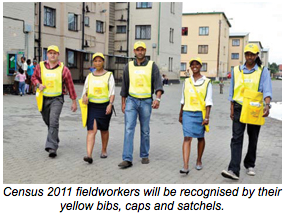 Stats SA Head Pali Lehohla says a group of more than 120 000 enumerators (or field workers as they are also called) would cross the length and breadth of South Africa from 9 to 31 October to count people in different institutions, residential homes, ports of entry such as harbours, land border posts and airports.
Stats SA Head Pali Lehohla says a group of more than 120 000 enumerators (or field workers as they are also called) would cross the length and breadth of South Africa from 9 to 31 October to count people in different institutions, residential homes, ports of entry such as harbours, land border posts and airports.
Lehohla said between 1 and 14 November, about 30 000 Census 2011 supervisors would conduct follow-up operations to ensure that no one would be missed by field workers during the census period.
“We are trying to bring down the number of people that we miss during counting,” said Lehohla. He said the Censuses of 1996 and 2001 had shown that Stats SA had to make preparations as early as possible to make sure that it reached everybody.
For next month’s Census, Stats SA has come up with three plans to make sure that it becomes successful. The first plan involves starting early with preparations such as the training of fieldwork coordinators, fieldwork supervisors and the fieldworkers who do the actual enumerating on the ground.
stand up and be COUNTED
www.statssa.gov.za
The second plan involves putting in extra measures such as the follow-up operations by the 30 000 supervisors.
The third plan will be a massive communication and publicity campaign after the Census.
“We believe with this three-point plan we will achieve what we set to do,” Lehohla said.
Between 1 and 8 October, a massive “Know Your Enumerator Campaign” will be conducted whereby communities would have an opportunity to know the fieldworker who will be counting them in their immediate environment.
Government is counting on you from 10 to 31 October when Census 2011 will be in action.
Led by Statistics South Africa, it will be South Africa’s third census since the start of democracy, with the last one held 10 years ago.
Through a census, the total number of people in a country at the time, is counted. In October, every person, including homeless people and illegal immigrants within South Africa’s borders, will be counted.
Why is a census held?
This count will produce valuable information about the country’s population. It will reveal things like age, gender, level of education, employment, income, standard of living and access to services like water, electricity and sanitation.
This information will help government to see what progress has been made in certain areas and what still needs to be done. The results of the census, which will only be available in 2013, will pave the way for government to plan and make decisions for the future and allocate resources where it is most needed.
What and who to look for
Enumerators (field workers with census forms) from Statistics South Africa will knock on your door during the census period. You will be able to identify them by their yellow Census 2011 over-shirts, caps and satchels and Census 2011 identity documents.
Confidential
Your personal information given to enumerators will be kept confidential and will not be shared with anyone. Enumerators will be appointed in their respective communities to cover over 14 million households.
- BuaNews
Our heritage our wealth
Our heritage our wealth Estelle GreeffFun & games
In South Africa, September is Heritage Month. This is a time when we celebrate our rich cultural heritage.
South Africa has eight World Heritage Sites. World Heritage Sites are places in different countries that are considered to be of "outstanding value to humanity". The purpose of World Heritage Sites is to identify, protect and preserve cultural and natural heritage around the world. There are more than 850 World Heritage Sites in 141 countries. The following places in South Africa are World Heritage Sites:
- iSimangaliso Wetland Park
- uKhahlamba Drakensberg Park
- Mapungubwe Cultural Landscape
- Richtersveld Landscape
- Cradle of Humankind
- Robben Island
- Cape Floral Region
- Vredefort Dome
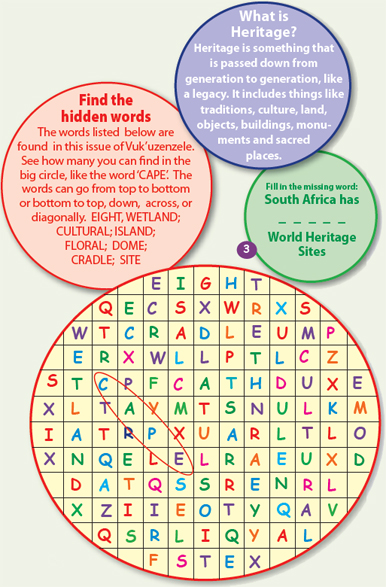
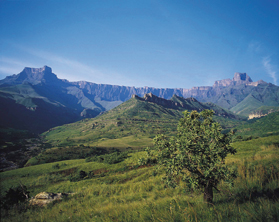
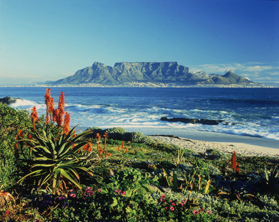
The pictures above depict two of South Africa's eight World Heritage Sites. See if you can name them by unscrambling the words.
1. AHuAMKLABH DEKSNARGBEH RAKP
_ _ _ _ _ _ _ _ _ _ _ _ _ _ _ _ _ _ _ _ _ _ _ _ _
2. APEC LOFRLA ROIENG
_ _ _ _ _ _ _ _ _ _ _ _ _ _ _ _
For more information about Heritage Day, call the Department of Environmental Affairs: 0800 200 200
Our heritage our wealth
Our heritage our wealth sadminFun & games
In South Africa, September is Heritage Month. This is a time when we celebrate our rich cultural heritage.
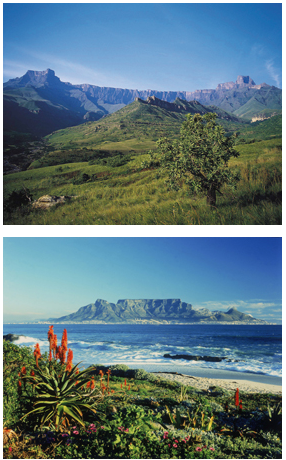 South Africa has eight World Heritage Sites. World Heritage Sites are places in different countries that are considered to be of "outstanding value to humanity". The purpose of World Heritage Sites is to identify, protect and preserve cultural and natural heritage around the world. There are more than 850 World Heritage Sites in 141 countries. The following places in South Africa are World Heritage Sites:
South Africa has eight World Heritage Sites. World Heritage Sites are places in different countries that are considered to be of "outstanding value to humanity". The purpose of World Heritage Sites is to identify, protect and preserve cultural and natural heritage around the world. There are more than 850 World Heritage Sites in 141 countries. The following places in South Africa are World Heritage Sites:
- iSimangaliso Wetland Park
- uKhahlamba Drakensberg Park
- Mapungubwe Cultural Landscape
- Richtersveld Landscape
- Cradle of Humankind
- Robben Island
- Cape Floral Region
- Vredefort Dome
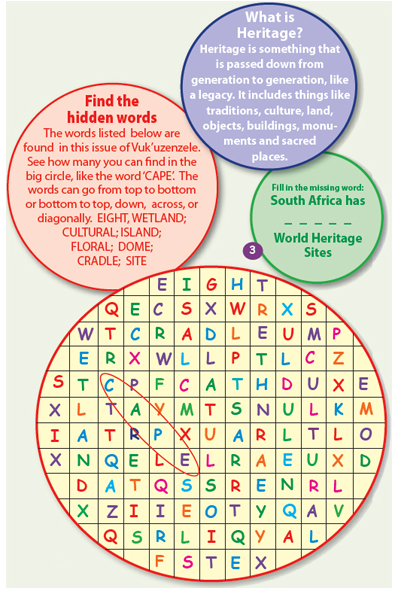
The pictures above depict two of South Africa's eight World Heritage Sites. See if you can name them by unscrambling the words.
1. AHuAMKLABH DEKSNARGBEH RAKP
_ _ _ _ _ _ _ _ _ _ _ _ _ _ _ _ _ _ _ _ _ _ _ _ _
2. APEC LOFRLA ROIENG
_ _ _ _ _ _ _ _ _ _ _ _ _ _ _ _
For more information about Heritage Day, call the Department of Environmental Affairs: 0800 200 200
Keep flying the flag
Keep flying the flag sadminSport & recreation
In September, South African athletes will compete at the All Africa Games in Mozambique and in October, the Springboks will represent the country at the Rugby World Cup in New Zealand as the defending champions.
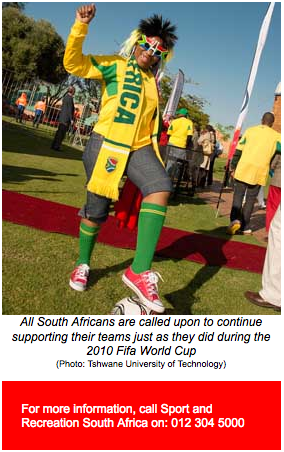 To show our support for our athletes at the All Africa Games and for the Springboks who will represent our country at the Rugby World Cup, South Africans must continue flying the flag and wearing the national colours.
To show our support for our athletes at the All Africa Games and for the Springboks who will represent our country at the Rugby World Cup, South Africans must continue flying the flag and wearing the national colours.
Proud history
This is very important says Minister of Sport and Recreation Fikile Mbalula. He urged all South Africans to support their teams just as they did during the 2010 Fifa World Cup.
“South Africa has a proud history of being a successful sporting nation. Sport is an important part of our culture and a multibillion rand industry that contributes more than two percent to the country’s gross domestic product,” Minister Mbalula said.
The Department has also launched the Ekhaya initiative called ‘Home Away from Home’. It is a hospitality village concept that government wants to stage at sports events.
The initiative reinforces the fact that South Africans are united behind the national teams at the Rugby World Cup and the All Africa Games.
The Ekhaya initiative is a platform owned by Sport and Recreation South Africa, mainly to offer hospitality services to South African sportspeople and their families. It also aims to promote South Africa as an attractive destination for business investment and tourism. The project is managed in partnership with the International Marketing Council of South Africa (IMC) and SA Tourism.
Play your part
The IMC, through its “Play Your Part” campaign, has partnered with the Department of Sports and Recreation on a domestic and international campaign to mobilise South Africans to support the RWC and All Africa Games, under the Magnificent Friday’s banner.
President of the South African Rugby Union (SARU), Regan Hoskins presented the Minister of Sport and Recreation with a Springbok supporter jersey at the launch and said he was encouraged by government’s support.
“We are delighted with and fully behind the minister’s call to all our citizens to support the Springboks and Team South Africa at the All Africa Games.
Green and gold
“SARU values this support and encouragement by the Minister of Sport, the IMC and South African Sports Confederation and Olympic Committee for our national rugby team, and want to all South Africans to show their passion and support for these two SA teams by proudly wearing the Green and Gold colours,” said Hoskins.
So show your support for your country. Fly the national flag and wear supporters’ jerseys or team colours on Fridays in the build-up to and during these sports events.
The Springboks are the reining Rugby World Cup champions and will defend their title in New Zealand later this year. The All Africa Games will take place in Mozambique in September.
Let the Golden Games begin
Let the Golden Games begin sadminSport & recreation
People who are older than 65 will have the opportunity to show how young and fit they still are when they compete in the Golden Games to be hosted in the Free State on 19 and 20 October. This is a national event where persons older than 65 compete in various sporting codes on a provincial level.
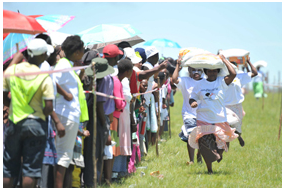 Winners of the provincial competitions then take part in the national competition in which all nine provinces compete for the top honours. Codes that form part of the Golden Games include athletics, duck walk, jukskei, and dress-up.
Winners of the provincial competitions then take part in the national competition in which all nine provinces compete for the top honours. Codes that form part of the Golden Games include athletics, duck walk, jukskei, and dress-up.
The Golden Games are part of the Sport and Recreation Department’s Older Persons Programme.
The Games have become increasingly popular with more than 1 000 participants competing in the 2010 games held in Richards Bay in KwaZulu-Natal. The Western Cape won both the 2009 and 2010 Games.
Director of Special Projects for the Sport and Recreation South Africa Kanyane Mohlala says the Department is looking forward to an even better and expanded Golden Games this year.
Mohlala said that the department was happy to jointly run the Golden Games project with the departments of social development and health. She said these two departments had contributed to the project both at national and provincial levels.
Mpumalanga sport scores big
Mpumalanga sport scores big sadminSport & recreation
The province's aim of becoming a model of sporting excellence will get a boost after a R1,5 million cheque was handed over to the Mpumalanga Sport Confederation (MSC) recently.
Indaba
Culture, Sport and Recreation MEC Sibongile Manana handed the cheque to MSC chairman Linda Zwane during a recent Mpumalanga Sport and Recreation Indaba at Mbombela stadium. More than 150 delegates attended the indaba. They discussed and made suggestions on how the province could turn into a model of sporting excellence.
Top athletes
The delegates proposed a unified and transformed sporting structure for schools, increased access to sport participation and professional coaching for all sporting codes to help produce top athletes.
The Mpumalanga Sport Confederation supports sport federations and councils at municipal and regional level and monitors and evaluates their work in different communities. The body also aims to bring programmes in line with the National Sport Plan.
National indaba
Manana said the department would work with the Mpumalanga Sport Confederation to finalise the provincial document and submit it to the national department of sport and recreation. A national indaba will be held later this year.